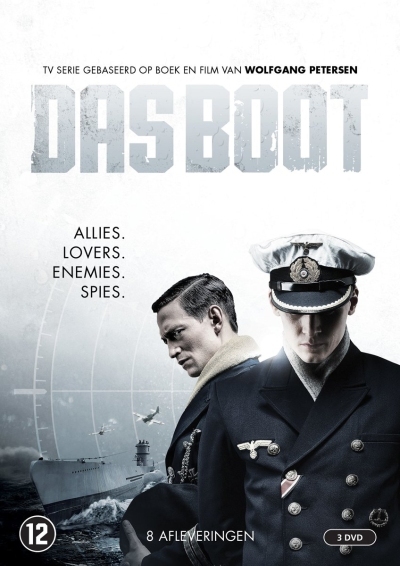| Title: | Das Boot |
| Director: | Andreas Prochaska |
| Cast: | Rick Okon, Vicky Krieps, Tom Wlaschiha et al. |
| Released: | 2018 |
| Playtime: | 480 minutes |
| Description: | During the seventh patrol of the U-96 in 1941 there was a man on board who would write film history. War correspondent Lothar-Günther Buchheim traveled along to report the experiences of the submarine crew for propaganda purposes. After the war he modeled his experiences into the novel "Das Boot" which appeared in 1973 and was published in many languages. In 1981 followed the West-German feature film and television series of Wolfgang Petersen with the same title, in which in unrivaled fashion was shown how the crew of the submarine was forced to stand their ground in a claustrophobic world, tormented by boredom, a lack of privacy and hygiene and a slowly increasing fear of death. The film with a German top cast became a classic, one that still scores high among film fanatics. It was a hard pill to swallow for those same fans when in 2018 a remake appeared. Is a worthy sequel of a film, that breathes the atmosphere of times gone by, even possible in the age of shallow Netflix-successes, inanimate computer animations and societal hypersensitivity? Whereas the productions from 1981 are about the U-96, in the miniseries it is the U-612 that plays a role. A big part of the miniseries plays underwater, on board of this submarine. While the original story stops in December 1941, the new story begins in the autumn of 1942. The submarine of the type VIIC, which is stationed in La Rochelle at the French Atlantic coast, is getting ready for a first mission under the command of the young captain Klaus Hoffmann, the son of a famous submarine-commander from the First World War. The crew, which for a part consists of old hands, among them first officer Karl Tennstedt, has tensions with its new, inexperienced commander. The mutual tensions and loyalty conflicts are of importance in the scenario, which is both based on the first book by Buchheim as on the sequel of 1995, "Die Festung", which moreover plays in a different period than the miniseries, namely in the summer of 1944. A tensive part of the story is the sinking of the U-612 and how the crew whilst being plagued by mortal agony have to get their damaged vessel moving again from the seafloor. In reality the submarine sank in August 1942, but both the circumstances as the rescue of the crew are different in the miniseries. It gives no factual reproduction of the historical facts, but instead a very free interpretation. In one of the episodes it becomes rather unbelievable when the crew of the submarine board a drifting ship without a living soul to see on it. When a few armed crew members enter the ship, they find a shifty crew and in the hold a group of Jewish refugees, of which the larger part has already passed away. It seems as if there is more a link with the present here (refugee ships on the Mediterranean Sea) than with the past. Other than the 1981 version, which largely plays on board of the submarine, this remake also plays on land, namely at La Rochelle where female protagonist Simone Strasse works as a translator for the Kriegsmarine, the Nazi German navy. Her brother is on board of the U-612 as a radio-operator. Just as the crew of the submarine, her loyalty too is tested when she gets stuck in a triangular relationship, with on the one side a French resistance woman and on the other side a Gestapo-officer. What stands out is that the moral differences between the navy leaders of the submarine base and the Gestapo are actually not that big. The Gestapo-man is not a sadistic Nazi brute like we know them from many other films and the members of the Kriegsmarine are no a-political soldiers, who have nothing to do with the war crimes under the Nazi occupation. Good and evil are diffuse which results in a moral test for the viewer. The scenes on board of the submarine do not disappoint; the challenges which the crew had to undergo are displayed convincingly. Compared to that, the story happening on the mainland is at times somewhat monotonous, as the story about the French resistance contains many elements we already know from other films. Nevertheless the two storylines make for the necessary alternation which the modern viewer is used to. The female roles and the inclusion of themes such as the persecution of Jews and collaboration and resistance in France make the miniseries more attractive for a broader audience. For the real fans of "Das Boot" from 1981 this modern continuation will demand time to get used to or even feel like profanity. For those who are not familiar with the original or who are able to put aside their nostalgic feelings, this contemporary miniseries offers viewing pleasure in abundance and invites to (re)watch the original film and series. |
| Rating: |     (Very good) (Very good) |
Information
- Translated by:
- Thijs de Veen
- Article by:
- Kevin Prenger
- Published on:
- 27-08-2019
- Last edit on:
- 19-06-2022



